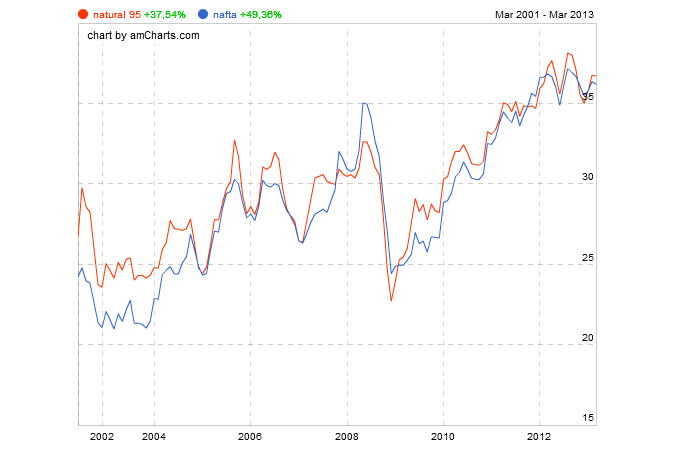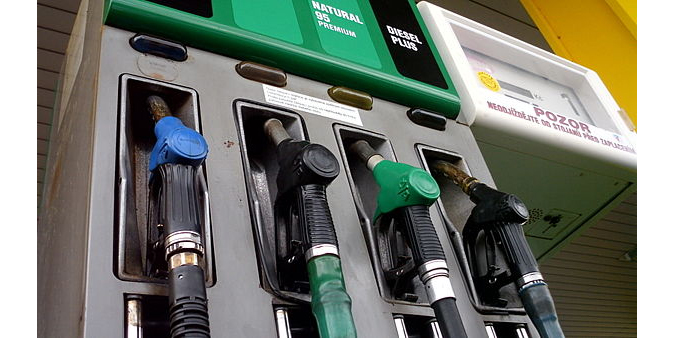Fuel prices, in the Czech Republic and the rest of the world, are highly dependent on developments affecting the regions and countries most involved in the production of crude oil. When these prices (often due to OPEC’s decision) rise, this tends to be reflected locally more strikingly so than in countries that produce oil.
The price of fuel in the Czech Republic has been rising relatively steadily for many decades. The following graph illustrates the developments from 2001 until March 2013. It is clear, despite the dips in the price in 2009 (due to higher supply than demand), that the price continues to grow. Much of this has to do with growing demand in the Asian markets, which have been pushing demand up and resulting in an increased price for this commodity.
PARTNER ARTICLE

Source: CCS
Processing – or should I say the refinery processes required to turn crude oil into Petrol or Diesel – naturally adds to the price. Since further processing needs to be done (often locally – i.e. in the Czech Republic – for example through Česká rafinérská), all the transport costs and the multiple intermediaries that the fuel passes through before it reaches the end consumer add to the final price.
Where does the Czech Republic stand in terms of the other countries in the world? It may be surprising that highly developed economies like that of Italy have prices that are significantly higher. Poland, our close neighbor, enjoys prices that are lower and often a lucrative destination for people living close to Polish borders. A quick shopping trip coupled with refueling a full tank will surely make the journey worth it.
The BBC provides a nifty comparison, which outlines the local price in comparison to other countries around the world. As can be derived from the data provided, Czech Republic’s fuel prices are actually lower than that of much of Western Europe and not too much higher than those of Eastern Europe. However, relative to the average salary, the purchasing power for fuel is much lower than that of Austria, Germany, and other European countries. There is also significant variance in the price locally within the Czech Republic. For a nice overview, region by region and city by city from CSS, check this link.
Quality of Fuel in the Czech Republic
So, where exactly does the Czech Republic stand in terms of quality of fuel? The true answer is that it is not bad at all. The testing is often quite rigorous and is stipulated by law. There are undoubtedly numerous cases each year of gas stations providing low quality or non-standard fuels – as is the case in most countries. This is often highly dependent on the norms that have been set that vary across countries. Some are more stringent, while others are less so. With the goal of producing more eco-friendly fuels, new requirements have been implemented and industry standards amended to reflect it.
In the Czech Republic, the ČOI (Česká obchodní inspekce – Czech Trade Inspection Authority) is responsible for monitoring and testing fuel distribution places including gas stations. Tests are required and stipulated by the Ministry of Industry and Trade (directive # 229/2004 Sb.), which sets the required quality standards for all fuels intended for travel on the ground. The tests have become increasingly strict and have been amended numerous times in the last couple of years. One of the commonly found problems in current fuels includes a higher-than-allowed concentration of sulfur (currently at a maximum of 12mg/kg) – a by-product and impurity that can be damaging for an engine in the longer term.
It is a fact that larger distributors falling under the umbrella of the Czech Association of Petroleum Industry and
Trade (ČAPPO) have been significantly less likely (circa 3%) to provide lower quality fuels, while smaller distributors were approximately 4 times more likely to have problems with their fuel. As such, it is therefore better to stick with renowned gas station companies that are more likely to adhere to the standards and use suppliers that are more inclined to closely monitor the quality of their fuel.
Aktuálně.cz has released an interesting interactive map of gas stations that have had problems and were in many cases fined for not providing the best quality fuel possible. Very often however, the severity of the problems varied significantly. In many cases, the fines were relatively small and not the fault of the gas stations themselves, but rather their respective suppliers.

Safety at Gas Stations
Safety at gas stations is something that may be considered to be questionable when compared to, for example, the UK. It is not too uncommon to notice people smoking in the very near proximity of gas stations or to be using mobiles while refueling the car. While the real likelihood of an accident involving mobiles is questionable (a fall would have result in a spark and the fumes would have to be concentrated), cigarettes pose a more realistic danger in case of a leak or a dangerously high concentration of fumes.
Smoking is prohibited at all gas stations here in the Czech Republic, but usually only at the very proximity of the fueling station itself. Despite the more common occurrence of smoking appearing nearby gas stations, the likelihood of fires and explosions is very low. Should you be scared when refueling? Not really.
If you want to save some money at the pump, map out your local gas stations and watch the prices. You may find that driving to the next city may save you considerable funds and leave you smiling knowing that you got a better deal.
What is your experience with prices and safety at gas stations in the Czech Republic?
Related articles












 Reading time: 4 minutes
Reading time: 4 minutes 




















